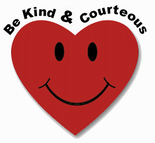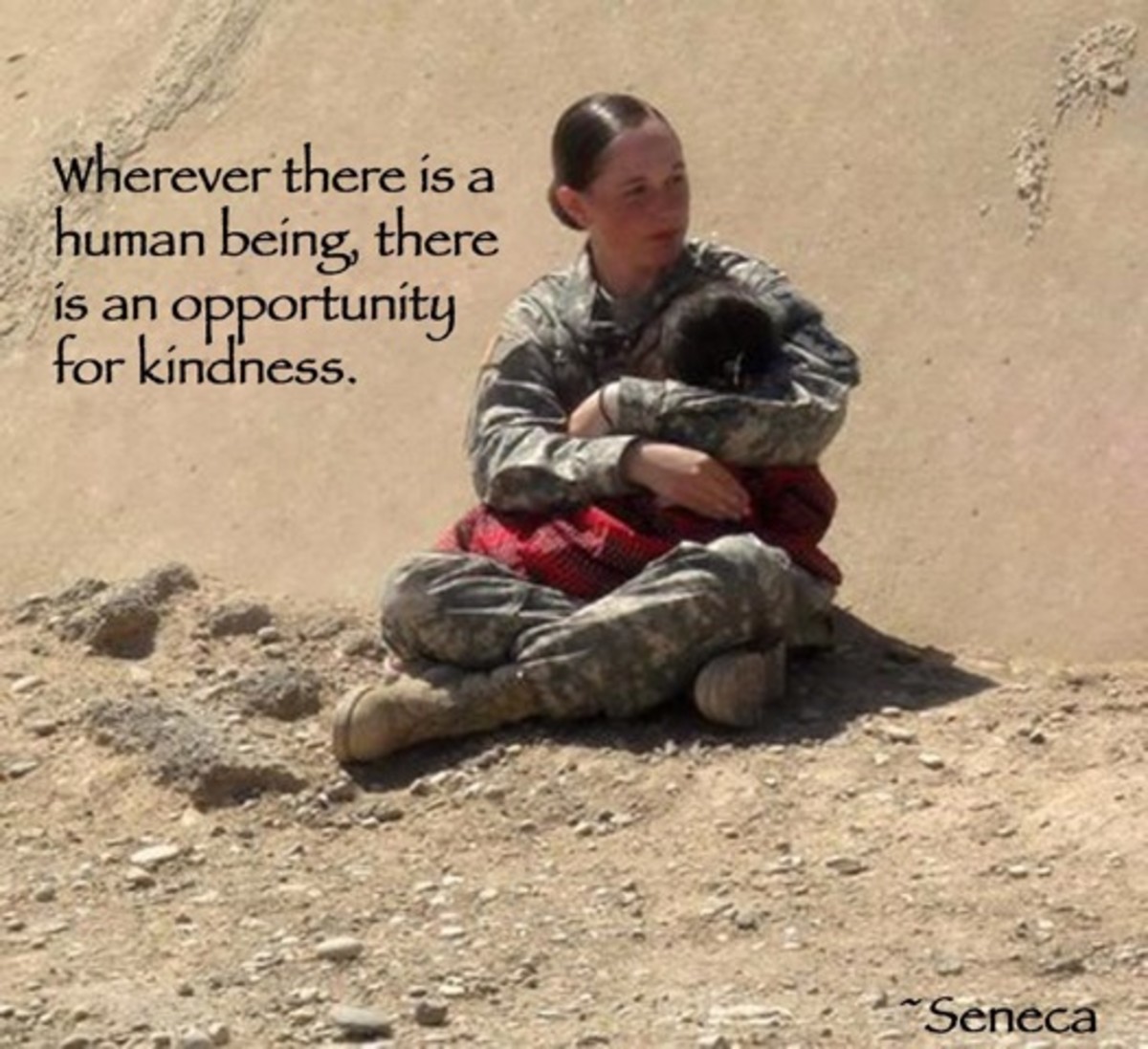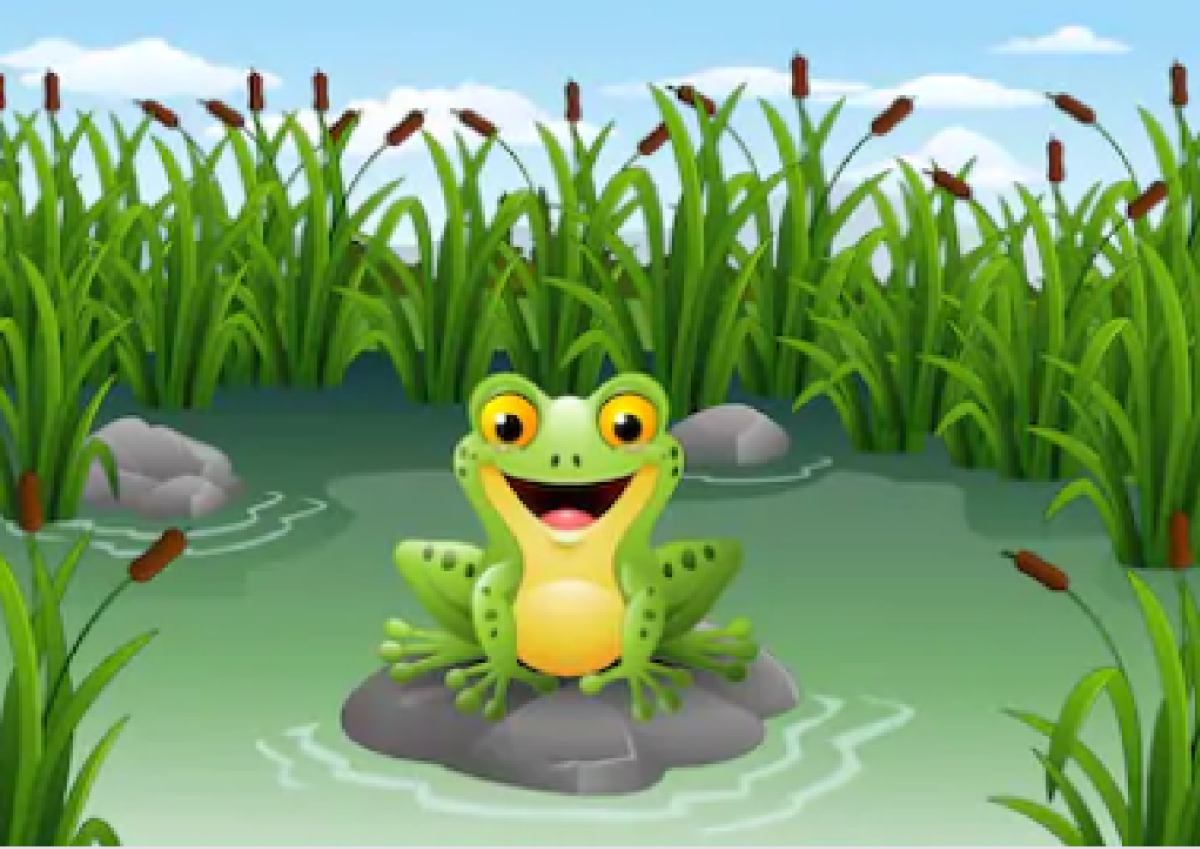- HubPages»
- Health»
- Mental Health»
- Emotions
Kindness - Lessons for our Children and Good for Adults
Kindness is the language which the deaf can hear and the blind can see.
~Mark Twain
The headlines of the latest news grab our attention by reporting the negative things happening. We read about negative acts perpetrated on innocent people across all age groups, races and genders. But there is another side to our society, one that occasionally makes the news, but gets reported less often. It is the acts of kindness, heroism, altruism, generosity and selflessness. It is the people who donate to charity, give their time to those less fortunate and offer compassion to the everyday person. These acts probably occur more often, yet we know about these stories less frequently. Why is that? Kindness to each other, has been proven to make us feel better. Why don’t we hear more stories about people looking out for each other? The world is a kinder place than the news portrays and here is the psychology behind it.
To be kind and generous and cooperative are good and admirable acts. A recent study actually found kindness may be contagious. One person's kind acts inspire kindness in others.Even little things like politeness and consideration make a difference. When people benefit from kindness, they tend to return it to subsequent people who were not originally involved. This domino affect or “paying it forward” helped people think of others. There may be something to this theory that kindness may be contagious. Generosity continues even after people experience it. Kindness it has been studied, created a domino like effect. As each person was kind to another, it created more kindness shown to others. In this experiment, the people were strangers. In relationships, kindness is a very important factor for healthy interactions. People who donate to charities often do so, without recognition or rewards. Most often the benefits are intrinsic.
Research has shown that people who are told they are kind, thoughtful, or benevolent will generally react by being kinder to others. Acts of kindness encourage people that there is a brighter tomorrow. Encouragement is a very important aspect to help people make changes in their own lives. People give of themselves in many ways. When we donate to a charity, a cause we believe in, we feel we are helping people, and encouraging the organization to continue their good work.
Kindness

Kindness and Cooperation
Kindness and cooperation may be part of our evolutionary development. When people cooperate with each other, it has been found through fMRI’s that the pleasure center in the brain gets stimulated. This, is believed to be a biological “hard wiring” within us. Emory University researchers did brain scans on 36 women while they were playing a game. The game is called Prisoner’s Dilemma. This game is used for over 50 years in researching social behavior. The players are rewarded monetarily based on their decision to either cooperate or to defect against the other player. 2 game players independently decide if they will cooperate or defect. It is a game that puts each player in a position of whether they will cooperate with each other or betray each other to benefit immediately. Depending the interaction of the two players, each received an amount of money as a reward.
The fMRI’s were done while the people were engaging in the game. This experiment allowed the researchers to observe where the brain “lit up” while the players were actually interacting. Patterns of brain activity would show up based on their interaction. 19 of the 36 subjects were played against a computer. 17 of the 36 subjects in the experiment played 3 sessions of games against human counterparts. There were different neural patterns depending on whether they had a computer or human opponent. When they played against another person, as opposed to the computer, the most common result was mutual cooperation. This was very interesting to the researchers because, players were rewarded more if they defected and didn’t cooperate. When they did cooperate, patterns of the brain lit up in the same area that have been previously connected to reward processing in the brain. Scientists believe from studies like this, that the idea of cooperating, helping our fellow man, and showing another kindness are either genetically part of us, or it became a learned behavior we acquired from socializing in our child and adolescent years.
Reasons We Reach Out to Others
There is most certainly a part of our brain that reacts positively to cooperative social interactions. One of the scientists running the experiment James Rilling, Ph.D stated "This reward circuit is strong enough to override the temptation to opt for selfish short-term gains," Studies also have shown that people feel better and happier after they donate to a charity
People were more likely to help strangers if, as children, they saw their own parents and other adults being kind to others. So it appears the future of our children’s kindness rests upon today’s adults setting a good example. Helping someone else, to donate to a charity, to offer compassion, help us, help others, and help our children to do the same as they get older. Children who observe their elders acting uncaring to others who are suffering, will likely grow up and do the same. Instilling acts of sharing, giving, and caring in children deserve attention. There is a saying when you save one person, you save the world. You will never know how you changed the world because a child was taught to be thoughtful and considerate and acted upon it.
There are many other influences that inspire others to reach out and help a stranger:
- the environment people find themselves in
- how many people are around
- how good the individual feels about themselves
- their own assertiveness level
- how much control they feel they have over their own life
- mood level
- people are more likely to help a child or the elderly
Donate to a Charity or Just Show Kindness to Others
Being philanthropic and those who donate to a charity, do so for many reasons. Givinginstitute.org listed 10 reasons people will give to a charity from believing in the organizations to loyalty, gratefulness, or desire to help the charity achieve its goals. People also give for tax reasons or to be recognized or memorialize someone through their donation.
Sometimes people who are the recipient of the kindness, view the acts with suspicion. Studies have found youths and the elderly react more positively to benevolent acts than other age groups. It is believed society plays a major role in this reaction. Females tend to be more receptive than men are to others who will randomly offer their help. Although men reacted on a more positive note when the giver was female.
Kindness has been shown to have positive effects for the giver and the receiver.
Every day, each one of us has the opportunity to go out and help someone else in even the smallest way. Even when we donate to charity in a small way, it has great meaning.
Little Acts Make a Difference
Sometimes, major events happen, like the shootings in Tucson, Arizona against Congresswoman Giffords and the other innocent people. We learned of the bravery and heroism of the people who grabbed the shooter and the gun and ammunition, and Congresswoman Giffords intern who bolted forth to save her. Their heroism helps to restore our faith in humankind, even when unspeakable tragedies occur. Little things count too, to restore our faith in mankind. These little things can be significant to one person or to yourself. Donate to a charity, offer to help someone in some way and you will be surprised at how good you feel. And they do make a difference. Your kindness, generosity, and thoughtfulness may help the quality of life for someone else. Our benevolence can influence our children, and the very acts we do, can change the world for the better. I hope you will do something kind for someone today, tomorrow and always. We can catch kindness from each other, and this inspiration will help make the world a better place.
Whether you offer a helping hand, give your spare change to donate to a charity, or hug someone today, your compassion helps in more ways than you know. Share a story of caring and let us inspire each other to do more good. Little acts can make a difference because we have people power and this power can make our world a better place for all of us!
Other Popular Topics
- Dogology: Dogs Uncanny Intelligence
Dogology: Dogs Uncanny Intelligence and Social Behavior In this article: Dogs behavior and their natural social instinct Apes vs Dogs Dogs sensitivity towards people Evolutionary... - Peoplality Personality Traits and Psychology
Having a big vocabulary is important in all aspects of life. Yet personality experts rely on only 5 words to generally describe characteristics of the psychology of people. How can 5 adjectives be the ... - Grieving When You Lose Someone Close To You
Healthy Tips to Help Deal With Grief, Loss, Death, Bereavement and All Those Words That Describe That Terrible Feeling of Going On Without the Special Person You Lost. A self help to grief counseling. There is... - Importance of Saying No - How and Why to Say No
No is a two letter word. It is so simple for a baby to say, yet so difficult for an adult to utter. The ability to say no can be so difficult. People have a tough time when it comes to saying no when... - Intentionally Positive
Self Help for Finding Happiness When Life Gets In the Way Happiness depends more on the inward disposition of mind than on outward circumstances. Benjamin Franklin We all want to be happy, but...






